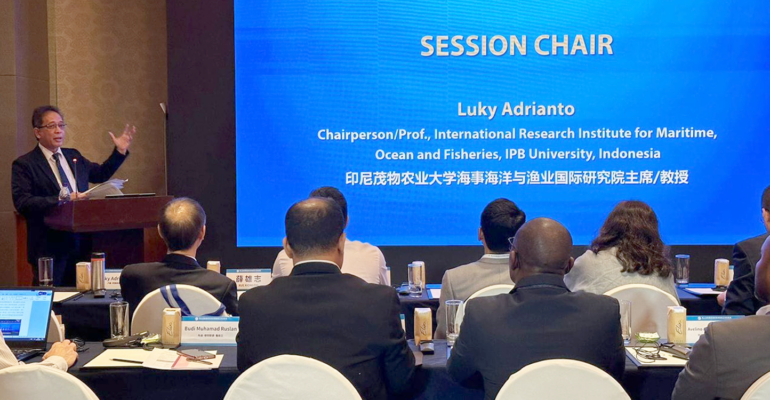IPB University’s LRI i-MAR Plays an Active Role in Maritime Silk Road Blue Economy Diplomacy

IPB University’s Maritime, Marine and Fisheries International Research Institute (LRI i-MAR) strengthens the blue-partnership framework in the development of Integrated Coastal Management (ICM) and Marine Spatial Planning (MSP) in the context of Sustainable Blue Economy (SBE) in countries that are part of the Maritime Silk Route (MSR).
This was done through the involvement of LRI i-MAR IPB University in the Maritime Silk Route Symposium on Enhancing Marine Spatial Planning Toward Blue Economy organized by the China Ocean Development Fund (CODF) on (26/9) in Beijing, China.
In this symposium, the discussion focused on four main topics in the form of parallel sessions, namely (1) Marine Spatial Planning; (2) Integrated Coastal Management; (3) Marine Eco-Environmental Protection; and (4) Blue Economy Development.
Prof Luky Adrianto, Chairman of i-MAR IPB University at this event had the honor to lead Parallel Session 2, namely Integrated Coastal Management (ICM) with the theme Improving Sustainability Development Capacity in the Maritime Silk Routes Countries. In the session, Prof Luky Adrianto acted as chair and led a dialog between countries related to the role of ICM in marine spatial planning and also the blue economy.
In the session, the ICM and MSP processes in the East Asia region (Partnerships in Environmental Management for the Seas of East Asia/PEMSEA), Indonesia, China, Malaysia, Brunei Darussalam, Singapore, Tunisia, Croatia, and Mozambique were discussed.
“There are three important things, first, ICM is an integrated, adaptive inclusive approach to solving complex problems in coastal and marine areas and achieving sustainable development goals in the region,” explained Prof Luky who is also a senior researcher at the Center for Coastal and Marine Resources Studies (PKSPL) IPB University.
Second, he continued, in ICM there is a planning cycle in which there is also the role of marine spatial planning (MSP). Third, in its implementation, the MSP process still uses the three main principles of ICM, namely the ecosystem, integrative and adaptive approaches.
On this occasion, the Professor of the Department of Aquatic Resources Management (MSP) IPB University also conveyed the idea of strengthening knowledge networks in the field of ICM for MRS countries through strengthening existing networks such as PEMSEA.
The symposium was attended by CODF Director, Mr Lv Bin who officially opened the event. Several remarks came from the Deputy Minister of Natural Resources of China, Representative of the Ministry of Commerce of China, Vice Chairman of the Environmental Commission of the People’s Congress of China, Seabed Authority, IOC Africa Region, IOC West Pacific Region, and Regional Fisheries Commission of Carribean, among others. (LA/Rz) (IAAS/Hap)



